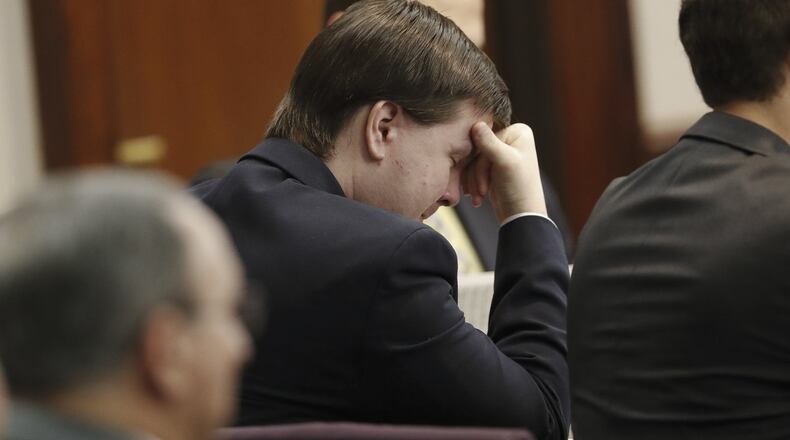Gavel to gavel
Look to AJC.com for our running account of the Ross Harris trial — updated as often as 12 times an hour — from the moment court convenes in the morning to the moment it recesses in the afternoon. On the same page you'll find WSB-TV's live feed from the courtroom.
Ross Harris’ former wife knew the police had bad news about her 22-month-old son as they escorted her into a conference room at her husband’s office.
But Leanna Taylor — then Leanna Harris — testified Monday that she remembered thinking she was in the middle of a terrible dream. “This isn’t real,” she recalls telling herself. “This isn’t happening.”
After being told her husband had left their son to die in his SUV that day, Taylor was taken to the Cobb County police station. There, she was reunited with her husband, who had just been charged in Cooper’s death. She told jurors Monday she felt she had to be the strong one.
"I knew that he was never going to forgive himself," she said in her first public remarks about her son's death and ex-husband's arrest since Cooper's funeral in June 2014. "I know that this was something that wasn't done purposely."
Taylor was unaware that her demeanor led Cobb police Det. Phil Stoddard to wonder whether the couple had colluded in killing Cooper. The lead investigator in the case had charged Harris partly because of his behavior in the hours after Cooper’s death was discovered.
Stoddard’s suspicions were further aroused when Leanna asked her husband, “Did you say too much?”
“I know how Ross responds to people. Especially to people he didn’t know,” Taylor said when asked what she meant. “He talks a lot even if he has nothing to say.”
“I didn’t understand what was happening I didn’t know why he was being charged. The only thing I could think in my head was, ‘What did you say?’ So those words came out.”
Taylor said Monday she knew her ex-husband did not intentionally leave Cooper strapped in his car seat, which drew an immediate and sharp objection from prosecutor Chuck Boring. Though the objection was sustained, the jury still heard Leanna say her son’s death was a mistake, something the defense badly wanted.
In his cross-examination, Boring tried several times to get Taylor to acknowledge that Ross Harris had led a double life, the central theme of the state’s case.
“If he’s saying foul things to a 15-year-old girl, that isn’t different than the way he portrayed himself to you?” Boring asked.
“I would agree it’s different, but it’s not a whole other person,” Taylor responded.
Earlier she testified that Harris was a loving father but was also absent-minded. When Harris felt insecure, she said, he typically responded with a blustering overconfidence to compensate.
“I would say he’s easily distracted,” said Taylor, who divorced Harris earlier this year after more than nine years of marriage. “Getting a paycheck and forgetting to cash it, those kind of things caused tension at the time.”
Like his father, Cooper was gregarious and fun-loving, she said. Jurors were introduced to the toddler through dozens of photos and videos, from Cooper’s sonogram to his birth to the beach trip the family had taken a few weeks before his death.
“(Cooper) would talk to or smile at anybody. It didn’t matter whether it was a stranger or not,” said Taylor, fighting back tears. “He was just amazing. I miss him so much.”
Her marriage to Ross was strong — outside of the bedroom. They approached everything as a team, whether it was changing diapers, cooking dinner or bathing Cooper, she testified.
But intimacy issues complicated their relationship. Harris first confessed a problem with pornography in 2008. Two years later she discovered he was sexting, Taylor said.
They sought counseling. They shared their problems with friends from church. Harris even got an “accountability partner” who was notified any time he visited a pornographic website. But the problem persisted.
Finally, in the fall of 2013, after discovering a text from another woman on his phone, Taylor “exploded,” she said. Later, she testified she offered him an out.
“I very bluntly one night said, ‘You want a divorce? If you want a divorce you can have it. I’ll give it to you,’” Taylor testified.
She said Harris responded, “That’s the last thing I want.”
Kilgore wanted jurors to hear that testimony, because it sharply contradicts the state’s theory. Prosecutors have said that Harris killed Cooper so he could live a single life and sleep with as many women as possible. Here, Taylor was offering him just that, but Harris declined.
Taylor also sounded eager to finally tell her side of the story. Until Monday the public’s opinion of her had been largely shaped by Stoddard’s testimony at a probable cause hearing in July 2014. Some people still think she was involved in Cooper’s death, though she was never charged.
She recalled her reluctance to go inside the Marietta apartment she shared with Ross and Cooper the night of her son’s death.
“If I went through the door it would be real. And I didn’t want it to be real,” Taylor said. “So I just sat down on the sidewalk outside.”
At length she entered the apartment, she said, and the emotion that had eluded her all day finally surfaced when she walked into Cooper’s room.
“I got in his bed and I just cried,” Taylor said. “I was finally able to cry.”
There were more tears on Monday, including when defense attorney Maddox Kilgore asked her whether Harris loved his little boy.
“Yes he did. Very much,” said Taylor.
She will return to the stand Tuesday for additional cross-examination by the state.
About the Author


